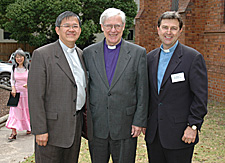 As St George's, Hurstville celebrated its 150th anniversary last weekend it was a recognition of the partnership that Anglo and Chinese congregations have had in reaching Hurstville with the gospel.
As St George's, Hurstville celebrated its 150th anniversary last weekend it was a recognition of the partnership that Anglo and Chinese congregations have had in reaching Hurstville with the gospel.
Archbishop Peter Jensen was present at the Sunday morning celebration attended by over 500 congregation members and guests.
"The church has to be the foundation of truth in any community and it is important that St George's maintain that role in Hurstville," Dr Jensen says.
"As I see over a hundred children here from Chinese backgrounds I hope that their parents who are present today will one day release them into ministry training so that they can continue to teach the truth of the gospel to the future generations."
The need for a Chinese congregation was recognised by the English speaking congregations of St George's in the mid-1990s.
Assistant minister at St George's, the Rev Albert Leung commenced his ministry at Hurstville in July 1997.
"At that time we had a small congregation of around 40 people. It was a combined Cantonese and Mandarin bilingual service," he says.
There are now two Chinese congregations, one Mandarin and one Cantonese service, that cater to over 250 adults.
"I concentrated on developing family ministry, setting up home groups, an adult and children's Sunday school and as the children grew up, a youth meeting also developed," Mr Leung says.
Mr Leung says there has also been good conversion growth over the years.
"We have had a lot of new comers who have shown an interest, we have shared the gospel with them, followed them up and led them to Christ. We have had around 15 adult baptisms through conversion every year for the last few years."
Building one church together
The rector of St George's, the Rev Allan Beaven says the church was going through a transition period when he commenced as senior minister in 2001.
"The Chinese ministry was moving along well but the Anglo services had become stagnant. There were two morning services, a small evening service and a lot of young people had already been encouraged to move to other churches," Mr Beaven says.
"My aim was to build the English-speaking ministry and to bring together the Chinese and Anglo congregations more meaningfully as one church."
The last five years has seen the five congregations of St George's work affectively in building a church together that is now attended by over 400 adults and children.
"We have one parish council, one set of finances, we have a combined Sunday school and combined morning tea for our 9:45am English speaking cogeneration and Mandarin and Cantonese congregations," Mr Beaven says.
The church also holds a combined Christmas carols service at the end of the year which is translated into Mandarin.
Mr Beaven says he has observed a "changing complexion' in the Sunday morning English language family service.
"About 50 per cent now come from a Chinese background. A lot of the young folks whose parents are at the Chinese language services have also gravitated towards our English language evening service."
Mr Beavan says the parish is already looking towards hiring an Australian Born Chinese (ABC) youth and children's pastor in 2008 to minister to the growing numbers of second generation young people from Chinese backgrounds who predominantly speak English.
It was 150 years ago today
The first Anglican church in Hurstville and the St George area was started in a tent on the Forest Road site 150 years ago by Charles Crew. It was also the location of the first incarnation of Hurstville Public School which also celebrates its 150th anniversary this year.
Bishop of Sydney Frederick Barker nailed the first piece of upright timber for the first permanent church building on December 8, 1856. The permanent building was constructed approximately two decades after that.
Mr Beaven says St George's has maintained good relations with the Hurstville Public School, which is the NSW's largest government primary school.
"We still run the Protestant scripture in the school which we have done for many years and hope to do far off into the future," he says.






















